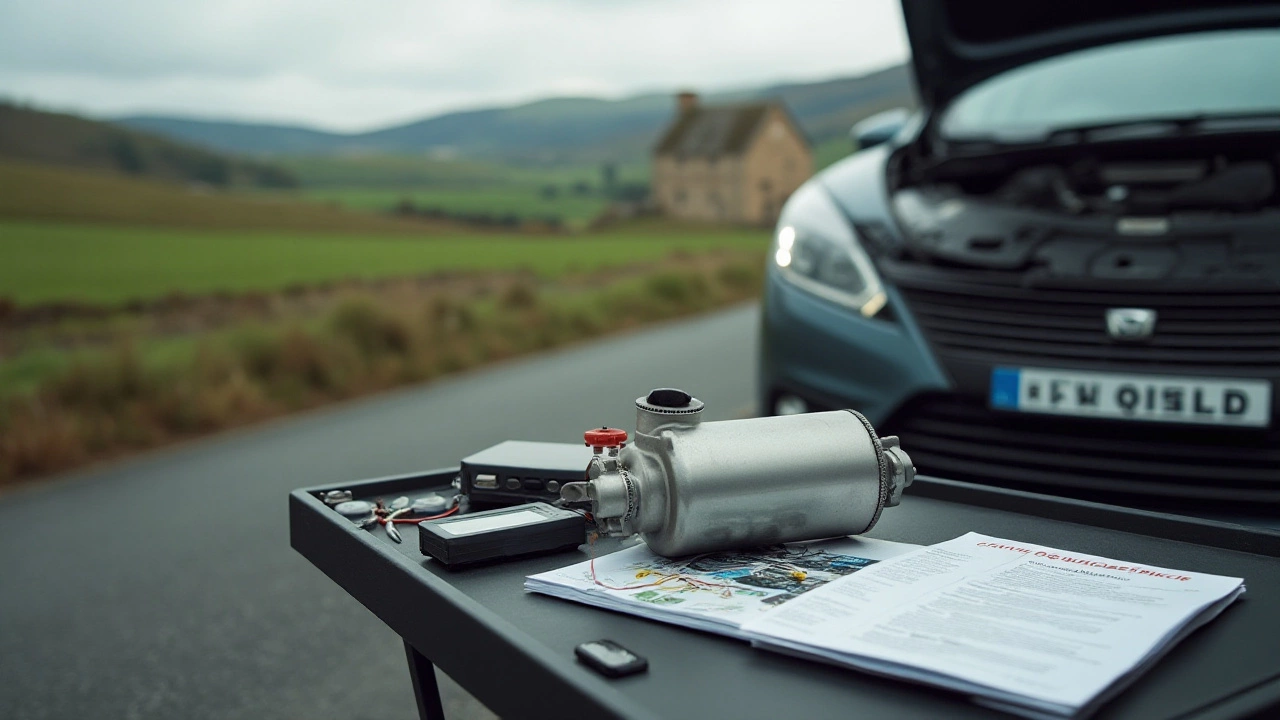Fuel pumps are the unsung heroes of your car's fuel delivery system. They are responsible for moving fuel from the tank to the engine, ensuring your vehicle runs smoothly. Yet, like all mechanical components, fuel pumps can fail over time, leading to various issues.
If your vehicle is having trouble starting, stalling unexpectedly, or if you've noticed a drop in fuel efficiency, a faulty fuel pump might be to blame. Before you rush to your mechanic or start replacing parts, it's crucial to diagnose the problem correctly.
In this guide, we shall explore the signs of a failing fuel pump, how you can confirm its malfunction through simple tests at home, and when it's best to seek professional assistance. Armed with this knowledge, you'll save time, money, and possibly prevent future problems from arising.
- Understanding the Role of a Fuel Pump
- Common Symptoms of a Bad Fuel Pump
- Basic Tests for Fuel Pump Issues
- Advanced Diagnostic Tools
- DIY vs Professional Help
- Preventive Maintenance Tips
Understanding the Role of a Fuel Pump
The fuel pump is an essential component of your vehicle's engine system, often taken for granted until something goes awry. Its primary function is deceptively simple: pumping fuel from the tank to the engine, ensuring that the right amount of fuel reaches the engine at the right time. This straightforward task becomes crucial as its steady supply of fuel ensures the engine runs smoothly at all times, irrespective of load and driving conditions. Without a properly functioning fuel pump, your car might burst into fits of jerky movements or lose power completely.
The mechanism of action involves drawing fuel through a filter to screen out particulates and debris, thereby preventing anything but the cleanest fuel from reaching the engine's heart. This ensures the longer life of various engine components and maintains the optimal combustion required for efficient vehicle performance. Modern fuel pumps are typically electric and are located inside the fuel tank. They are designed to be robust and long-lasting. However, wear and tear, contaminated fuel, or electrical issues occasionally lead to malfunctions, putting a wrench in your day-to-day commuting plans. In these instances, it's crucial to be able to pinpoint problems accurately.
A well-known quote from renowned automotive engineer Edgar Miles addresses this:
"The thrumming heart of every automobile is its fuel pump; without it, the vehicle is but a shell without purpose."His words encapsulate how fundamental this component is to vehicle operation. Despite its relative simplicity compared to other engine parts, the precision needed for the fuel pump to maintain consistent pressure and volume can't be overstated. Even minor fluctuations can result in poor engine performance and reduced fuel efficiency. Fuel pumps must adapt to changes in driving conditions, ensuring maximum power output and mileage efficiency – a most underappreciated balancing act.
It's also worth mentioning that fuel pumps complement other complex systems in your car, such as the injectors and the engine management system. The efficient delivery of fuel not only requires a robust pump but also the harmonious operation of all related components. As fuel pumps directly impact emissions, maintaining a well-functioning pump is not just about performance; it's also about adhering to the environmental standards which are becoming ever stricter across the globe.
Common Symptoms of a Bad Fuel Pump
Your vehicle’s fuel pump is a critical component that keeps the engine running smoothly. When it starts to go bad, it doesn't always warn you with clear signs, making it challenging even for experienced car owners. The first indication could be subtle, such as your engine sputtering now and then. Think of a time when you've been driving along steadily, and the engine momentarily seems to lose power. This sputtering is an early symptom that something isn't quite right. An engine needs a consistent fuel supply, and if a fuel pump can't maintain the required pressure, you’ll begin to notice these interruptions.
Another telltale sign is a noticeable power loss when your car is under stress, like when climbing a hill or carrying a heavy load. This happens because a malfunctioning pump cannot efficiently deliver enough fuel, causing the engine to struggle. Likewise, frequent engine stalling, especially at idle, can indicate a failing pump. At this point, it's worth noting, a faulty pump can mimic problems originating in other parts of the fuel system or ignition, making diagnosis tricky without proper testing.
It's also common to experience difficulties starting your vehicle. Suppose you need to crank the engine several times before it fires up, or perhaps it doesn’t start at all. While this issue can stem from a drained battery or faulty starter, a bad fuel pump is often the culprit as well. Another symptom to watch for is surging, where the car feels like it's accelerating without you pressing the pedal harder. This happens due to irregular fuel flow in the combustion engine.
Additionally, never ignore the fact that low gas mileage might also be connected to fuel pump woes. If your vehicle suddenly uses up more gas than it should, yet there is no immediate alteration in your driving habits or fuel quality, the pump’s inefficiency might be at play. When fuel doesn’t reach the engine effectively, it forces it to consume more than usual, translating into more frequent fuel stops.
Curiously, strange sounds – especially a whining noise coming from the gas tank area – are another common indicator. While cars have a lot of components that generate noise, distinguishing between normal and abnormal sounds can give insights into mechanical problems. A dying fuel pump often sounds like a low-frequency hum, more noticeable in hot temperatures or when the gas tank is low.
"A vehicle's performance issues often serve as a faint whisper warning drivers of a deteriorating fuel pump," states John, a seasoned mechanic with over two decades of experience handling vehicle diagnostics at reputable garages.
To wrap up on symptoms, pay attention to overheating engines. It might not be the first symptom that comes to mind, but an ailing fuel pump can cause excessive heat due to inadequate lubrication. Overheated engines can reflect broader complications in the fuel system that need immediate attention to prevent lasting damage.

Basic Tests for Fuel Pump Issues
When trying to determine if your vehicle's fuel pump is in good working order, conducting a few basic tests can go a long way. These straightforward examinations not only save time but also narrow down the problem efficiently. The first step in the diagnostic process involves listening for unusual sounds. When you turn the key in the ignition without starting the engine, a working fuel pump should emit a gentle whirring sound from the rear of the vehicle. A complete lack of this sound may indicate a faulty pump or even electrical issues. This simple sound check, often overlooked, can provide the first clue.
If auditory tests don't reveal much, don't worry; there are still plenty of troubleshooting options. The next step involves checking for adequate fuel pressure. This requires a fuel pressure gauge, which can be acquired from most auto parts stores. By attaching the gauge to the fuel rail, typically found along the engine, one can directly measure the pressure output delivered by the pump. A significant deviation from the manufacturer's specified pressure range might mean a weak or failing pump. Taking the time to consult your vehicle's repair manual can be invaluable in confirming these specifications.
The moral of this fable is to never underestimate the power of basic observations. Even the cleanest cars can fall prey to dirtied fuel filters, another potential source of trouble. Frequent cleaning and replacement of fuel filters help ensure uninhibited fuel flow. One effective way to confirm this is by temporarily removing and inspecting the filter for clogging. If it's densely packed with debris, it may be an inexpensive fix rather than a full pump replacement. Remember, diagnostic efforts should never be rushed, as they uncover issues that often masquerade as more significant problems.
In certain cases, conducting an electrical check might also be warranted. This involves using a multimeter to test the fuel pump's relay and electrical circuits. By tracing the electrical flow, you can often find if the issue stems from the wiring rather than the pump itself. Of course, this is a bit more advanced and may require specialized knowledge, but even a simple continuity test can demystify the situation. If challenged, remember that local repair shops often welcome inquiries, providing insight on suitable solutions.
According to a widely regarded source in the automobile industry, "Regular checks and maintenance of your vehicle's fuel system can prevent most common malfunctions."
"Prevention is better than cure, especially in automotive diagnostics," says Tom Magliozzi, co-host of Car Talk.These experts emphasize the importance of thorough testing and understanding your vehicle's singular quirks. Armed with the right knowledge and tools, car owners can confidently tackle potential fuel pump issues head-on and effectively prolong their vehicle's operational life.
Advanced Diagnostic Tools
When it comes to pinpointing issues with your car’s fuel pump, the right tools can make a significant difference. While basic tests might uncover some symptoms, advanced diagnostic tools provide more targeted insights, saving you from unnecessary guesswork. These tools go beyond surface symptoms and dig deeper into your car's mechanical soul; they offer precision and depth in diagnostics. For instance, using a diagnostic scanner can reveal error codes that offer clues to the underlying issues, pinpointing where the fault may lie. This can be especially helpful when the symptoms overlap with other common car troubles, such as ignition issues or battery malfunctions.
Diagnostic Scanners
A diagnostic scanner is among the most powerful tools in diagnosing vehicle diagnostics. These devices interface with your car’s onboard computer systems. When a fuel pump malfunctions, the car's sensors often pick up related faults, and the onboard diagnostics (OBD) system records these events, which can be retrieved by the scanner. The codes retrieved provide a snapshot of what might be happening under the hood, giving you a detailed picture. Some advanced scanners not only read generic codes but can also pinpoint more specific trouble codes related to your make of car, which can often save hours of testing guesswork. Investing in a good quality diagnostic scanner could be the difference between a straightforward repair and a prolonged, costly troubleshooting journey.
"Having immediate access to diagnostic codes is like having a map in a foreign city; it guides you swiftly to the problem," says renowned auto mechanic Joe Barlow.
Fuel Pressure Test Kit
Conducting a fuel pressure test is another critical method in diagnosing a bad fuel pump. A fuel pressure test kit allows you to measure the pressure in the fuel system directly. By comparing the current pressure readings against the manufacturer's specifications, you can determine whether the pump is providing adequate pressure to the engine. Low pressure can indicate a failing pump or a clogged filter, while excessively high pressure might point to a regulator problem. These kits usually come with pressure gauges and adapters tailored for different vehicles, enabling a straightforward setup. Knowing how to use the kit and interpret the results requires a bit of learning, but the payoff in diagnostic accuracy is well worth the effort.
Oscilloscope Testing
For those with a penchant for precision, oscilloscopes can examine the electrical signals within your fuel pump circuit. By generating a waveform, this method allows you to observe the electrical current going to the pump, providing real-time feedback on the condition of the pump itself. Experienced technicians can interpret these waveforms to evaluate whether the pump is receiving the right level of current flows and whether it's working within healthy parameters. This method is excellent for diagnosing intermittent issues, which might only present themselves occasionally but can be accurately captured and diagnosed using this technology.
Using a combination of these advanced diagnostic tools, car enthusiasts and professional mechanics alike can better identify underlying problems that basic tools might miss. By blending technology with mechanical know-how, you’ll equip yourself to tackle even the trickiest of automotive puzzles. Car maintenance demands a balance of skills and tools, but when properly armed, you don't just fix cars – you master them.

DIY vs Professional Help
Deciding whether to tackle a potential fuel pump issue yourself or to seek professional assistance can often be a conundrum. The first thing to consider is your level of experience and comfort with vehicle maintenance. For some, there is a real sense of satisfaction in diagnosing and resolving car issues independently. However, it’s important to gauge the intricate nature of the task at hand. While swapping out an air filter or changing oil might be straightforward, fuel pump diagnosis and replacement can involve significant technical know-how. Handling this task incorrectly might lead to more harm than good, affecting your car's performance and potentially causing new issues.
Before you decide to go the DIY route, ensure you have the right tools and safety gear. Fuel system work requires specific precautions due to the flammable nature of the materials involved. Familiarize yourself with your vehicle's repair manual, as each car model can have unique requirements when it comes to fuel pump access and removal. If you're feeling apprehensive about diving into the repair yourself, you’re not alone. Many car enthusiasts choose to start with simpler tests, like checking the fuel pump fuse or relay, before consulting a professional for more complex diagnostics.
On the flip side, professional mechanics bring a wealth of experience to the table. They have advanced diagnostic tools that can quickly pinpoint issues, saving you time and possibly money in the long run. Professionals can also provide a warranty on their work, an assurance DIY repairs can lack. According to the Automotive Service Association, “The right professional can offer peace of mind with reliable and guaranteed service.” Moreover, professionals stay updated on the latest techniques and vehicle models, crucial knowledge as cars become increasingly sophisticated.
If cost is your main concern, consider reaching out to several repair shops to gather quotes. Some garages offer complimentary diagnostics, which can be a great way to confirm if the fuel pump is indeed the issue. This can sometimes align with later DIY repair efforts. Interestingly, a diverse set of shops might even quote vastly different prices, a result of varying overhead costs, expertise levels, or perceived complexity of the job. When choosing a professional, look for ASE (Automotive Service Excellence) certification, a clear marker of qualified skills in the automotive industry.
In summary, the choice between DIY versus hiring a professional depends largely on your confidence and comfort level. While a DIY enthusiast might relish the challenge of replacing a fuel pump, many others value the expertise and reassurance a professional provides. The key is being well-informed and assessing the situation realistically to avoid adding unnecessary stress or expense to the problem. Whether you decide to go it alone or seek help, addressing an issue with the fuel pump in a timely manner is crucial to ensuring your vehicle remains in good running condition.
Preventive Maintenance Tips
Keeping your vehicle's fuel pump in tip-top condition is crucial to ensure optimal performance. Regular maintenance is the key to extending the lifespan of your fuel system components and avoiding costly repairs. One essential tip is to maintain a healthy fuel level. Constantly driving on a nearly empty tank can cause the fuel pump to overheat and wear faster. Fuel acts as a coolant for the pump, so always aim to keep at least a quarter tank of fuel. By doing so, you're ensuring the pump operates efficiently and stays cool during operation.
It's also vital to regularly inspect and replace your vehicle's fuel filter as part of your maintenance routine. A clogged fuel filter can lead to reduced fuel flow or even complete blockage, putting unnecessary strain on your fuel pump. Most manufacturers recommend changing the fuel filter every 20,000 to 40,000 miles, but always check your owner's manual for specific guidelines. A clean filter ensures that contaminants do not reach the fuel pump or engine, significantly reducing the risk of failure.
Another critical aspect of fuel pump maintenance is using the right fuel type. Always adhere to the manufacturer’s recommendation when it comes to fuel octane ratings. Using a lower octane fuel than required can cause knocking or pinging, leading to long-term damage to the fuel pump and engine. Additionally, avoid filling up at stations where fuel tanks are getting refilled, as this can stir up sediment at the bottom of the tank and result in clogged fuel lines.
Driving habits also play a considerable role in fuel pump longevity. Aggressive driving, such as sudden accelerations and decelerations, can lead to increased demand on the fuel pump, causing it to wear out prematurely. Opt for smooth, steady driving to maintain consistent fuel pressure. Routine engine tune-ups will also help indirectly by keeping the entire fuel system in good health, ensuring your engine and pump work harmoniously.
In terms of periodic checks, it's beneficial to listen for any unusual whining noises coming from the fuel tank area when the car is running. Such noises can often be an early warning of a failing pump, allowing you to address the issue before it becomes severe. If you hear anything out of the ordinary, consult a trustworthy mechanic who can assess the condition of the pump. When in doubt, always rely on professional diagnostics.
"An ounce of prevention is worth a pound of cure, especially when it comes to maintaining your vehicle's fuel systems," states automotive expert Richard Southwell, illuminating the importance of consistent upkeep rather than waiting for something to go wrong.
By incorporating these preventive maintenance tips into your regular vehicle care routine, you can ensure the resilience of your fuel pump and gain peace of mind on the road. Being proactive is not only beneficial for vehicle longevity but can also result in substantial cost savings by avoiding unexpected repairs.
| Maintenance Task | Recommended Interval |
|---|---|
| Check Fuel Level | Weekly |
| Replace Fuel Filter | 20,000-40,000 miles |
| Listen for Unusual Noises | Monthly |
| Use Correct Fuel Type | Continuously |

